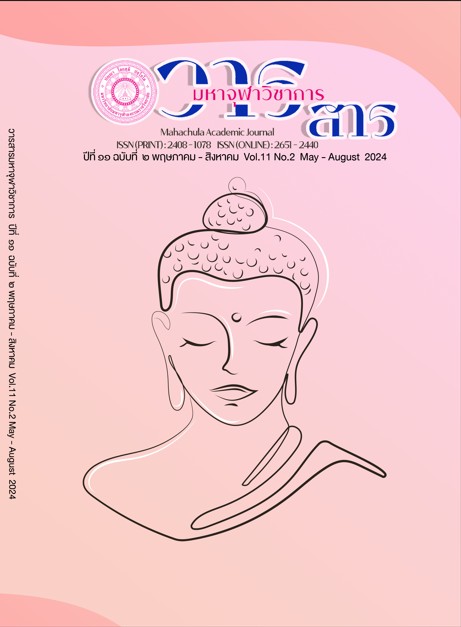Guidelines for distance education via satellite According to the Buddhist principles of School network group 4, Mueang Nakhon Sawan District Nakhon Sawan Province (Pak Nam Pho Network) Nakhon Sawan Primary Educational Service Area Office District 1 -
Main Article Content
Abstract
Abstract
The objectives of this study were: 1) to study the status of the management of the distance education VIA Satellite (DLTV) of School Network Group 4, Mueang Nakhon Sawan District, Nakhon Sawan Province (Pak Nam Pho Network), Nakhon Sawan Primary Educational Service Area Office 1, and 2) to make the guidelines for the management of the distance education VIA Satellite (DLTV) of School Network Group 4, Mueang Nakhon Sawan District, Nakhon Sawan Province (Pak Nam Pho Network), Nakhon Sawan Primary Educational Service Area Office 1. This research applied Mixed Methods Research consisting of Qualitative Research and Quantitative Research. The sample was 115 administrators and teachers from 11 schools in School Network Group 4, Mueang Nakhon Sawan District, Nakhon Sawan Province (Pak Nam Pho Network), and 9 key informants. The research instruments were the questionnaire and the Semi-structured Interviews. The data analysis used content analysis. The statistics used frequency, percentage, mean, and standard deviation.
The research results were as follows:
(1) The status of the management of the distance education VIA Satellite (DLTV) of School Network Group 4, Mueang Nakhon Sawan District, Nakhon Sawan Province (Pak Nam Pho Network), Nakhon Sawan Primary Educational Service Area Office 1 found that overall, it was at a high level. When considering each aspect, it was found that planning, operation, evaluation, and improvement were at a high level. (2) The guidelines for the management of the distance education VIA Satellite (DLTV) of School Network Group 4, Mueang Nakhon Sawan District, Nakhon Sawan Province (Pak Nam Pho Network), Nakhon Sawan Primary Educational Service Area Office 1 consisted of the 1st aspect was the planning: the administrators motivated the personnel and related people in planning, made the understanding, realized the importance and advantage of teaching and learning, and set policies, vision, and mission in promoting the teaching and learning management together by the distance education VIA Satellite to the implementation together, the 2nd aspect was the operation: the administrators shared the work for the personnel suitably to the knowledge, capability, and skill useful to develop the teachers and personnel, made the realization and understanding in the teaching and learning management, set vision or strategies, provide the committee for helping, solving the problems, or supporting the teaching and learning management by the distance education VIA Satellite of the schools, the 3nd aspect was the evaluation: the teachers and students specified the pattern and method of evaluation together, the administrators should provide the community activities or learning society, evaluate the projects and activities in the teaching and learning management at least once a year, and evaluate the application of the knowledge for developing the teachers and personnel in the teaching and learning management by the distance education VIA Satellite at least once a year, and the 4th aspect was the improvement: the administrators and teachers developed the system of DLTV teaching and learning continuously and systematically together, improve the distance education VIA Satellite with the information from evaluating the distance education VIA Satellite by analyzing the strength and the development, and exchanged and learnt the results of internal supervision for the planning and development.
Keywords: distance education via satellite ; the Buddhist principles; Pak Nam Pho Network
Article Details

This work is licensed under a Creative Commons Attribution-NonCommercial-NoDerivatives 4.0 International License.
References
บรรณานุกรม
กิดานันท์ มลิทอง, เทคโนโลยีการศึกษาและนวัตกรรม, พิมพ์ครั้งที่ ๒,กรุงเทพมหานคร: จุฬาลงกรณ์
มหาวิทยาลัย, ๒๕๔๓
กุณฑิกา พัชรชานนท์ และบัลลังก์ โรหิตเสถียร, ทิศทางการอาชีวศึกษาเอกชนสู่สากล, [ออนไลน์], แหล่งที่มา
: http://www.moe.go.th/websm/๒0๑๓/oct/๓๓๒.html.๒๕๕๖.[๓๑ มกราคม ๒๕๖๖]
ชาตรี แนวจําปา, “การประยุกตใชอิทธิบาท ๔ ในการปฏิบัติหนาที่ของบุคลากรสำนักปองกันและ บรรเทาสา
ธารณภัย กรุงเทพมหานคร”, วิทยานิพนธพุทธศาสตรมหาบัณฑิต สาขารัฐประศาสนศาสตร์, บัณฑิตวิทยาลัย : มหาวิทยาลัยมหาจุฬาลงกรณราชวิทยาลัย,๒๕๕๒.
เชียรศิริ วิวิธสิริ, การศึกษาผู้ใหญ่และการศึกษานอกโรงเรียน: เทคโนโลยีทางการศึกษา = Adult &
nonformal education techonology, พิมพ์ครั้งที่ ๒,กรุงเทพมหานคร: มหาวิทยาลัยศรีนครินทร์วิโรฒ ประสานมิตร, ๒๕๓๕.
บุญมี บุญเอี่ยม, “ศึกษาการนําอิทธิบาท ๔ ไปใชในการทำงานศูนยควบคุมการบินภูเก็ตบริษัท วิทยุการบิน
แห่งประเทศไทย จํากัด”, วิทยานิพนธการศึกษามหาบัณฑิต,บัณฑิตวิทยาลัย: มหาวิทยาลัยทักษิณ ๒๕๔๔
พระครูพิศาลถิรธรรม, “ประสิทธิภาพการบริหารจัดการวัดของเจาอาวาสในเขตธนบุรี”, วิทยานิพนธพุทธ
ศาสตรมหาบัณฑิต, บัณฑิตวิทยาลัย: จุฬาลงกรณราชวิทยาลัย, ๒๕๕๓.
พระมหาสุนันท์ สุนนฺโท (รุจิเวทย์), “ความคิดเห็นของพระสงฆ์ต่อบทบาทด้านการเผยแพร่พระพุทธศาสนา
ของคณะสงฆ์อำเภอวังน้อย จังหวัดพระนครศรีอยุธยา”, วิทยานิพนธพุทธศาสตรมหาบัณฑิต ,บัณฑิตวิทยาลัย: จุฬาลงกรณราชวิทยาลัย, ๒๕๕๕.
พิสณุ ฟองศรี, วิจัยทางการศึกษา, พิมพ์ครั้งที่ ๒, กรุงเทพมหานคร : สำนักพิมพ์เทียมฝ่าการพิมพ์, ๒๕๔๙. เพ็ญนภา พิลึก, “การประยุกต์ใช้หลักพุทธธรรมในการบริหารสถานศึกษา: กรณีศึกษาผู้บริหารสถานศึกษา
สังกัดสำนักงานเขตพื้นที่การศึกษามัธยมศึกษา เขต ๔๒”, วิทยานิพนธ์พุทธศาสตรมหาบัณฑิต สาขาวิชาการบริหารการศึกษา, (บัณฑิตวิทยาลัย: มหาวิทยาลัยมหาจุฬาลงกรณราชวิทยาลัย, ๒๕๕๖.
ศูนย์พัฒนาคุณภาพการศึกษาด้วยเทคโนโลยีการศึกษาทางไกล, แนวทางการดำเนินการพัฒนาคุณภาพ
การศึกษาด้วยการศึกษา ทางไกลผ่านดาวเทียม (DLTV), กรุงเทพมหานคร: อักษรไทย, ๒๕๕๙.
สำนักงานเขตพื้นที่การศึกษาประถมศึกษานครสวรรค์ เขต ๒, แนวทางการนิเทศ กำกับติดตาม ประเมินผล
และรายงานผลโครงการขยายผลการศึกษาทางไกลผ่านดาวเทียม, นครสวรรค์: สำนักงานเขตพื้นที่การศึกษาประถมศึกษานครสวรรค์ เขต ๒, ๒๕๕๗.
สิริพร กัณฑมณี, “การบริหารโครงการการศึกษาไทยผ่านดาวเทียมในโรงเรียนสังกัดสำนักงานเขตพื้นที่
การศึกษาประจวบคีรีขันธ์”, วิทยานิพนธคุรุศาสตรมหาบัณฑิต, บัณฑิตวิทยาลัย: มหาวิทยาลัยกรุงเทพธนบุรี, ๒๕๔๙.
Cronbach, Lee J, Essentials of psychological testing, (4th ed.), New York: Harper & Row, 1971.
Taro Yamane, Statistics: An Introductory Analysis, New York: Harper and Row Publications,


